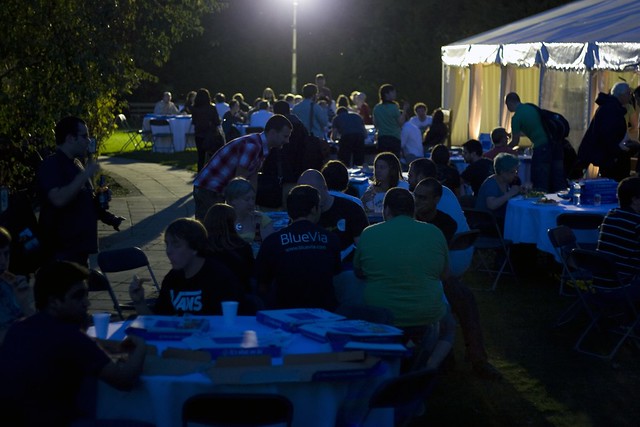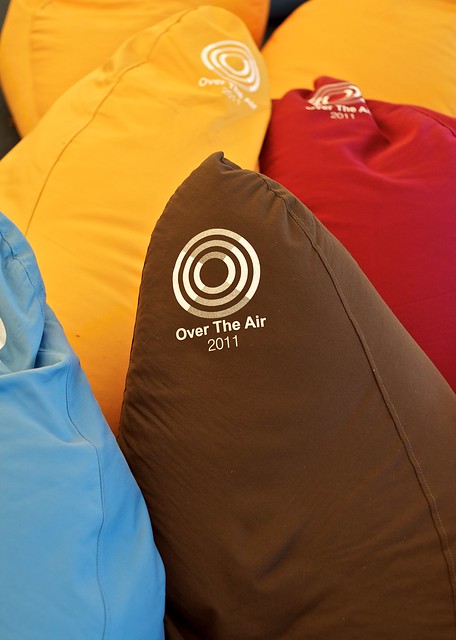Last week I spent one day at Over the Air, checking some of the most interesting evolutions in the mobile world. For those of you who don’t know what Over the Air is:
“a unique tech-agnostic event for and by the developer community, featuring technical workshops where attendees can roll up their sleeves and tinker with new platforms, operating systems, APIs & SDKs; and tutorial sessions that feature real business cases, new insights and a healthy dollop of inspiration. Attendees are invited to stay overnight so that they can work on ideas, apps and hacks on the fly – to be entered into the various hack-athon competition categories and demo’ed on the second day. It’s a great vibe of bean bags, gadgets, knowledge sharing, hacking & lots of good geekery”
In a less formal way, it’s a mix between a conference and a hackday. With beanbags, and people sleeping in tents in a park overnight.


And I had the opportunity to speak about what we are doing at the Web Foundation, helping the Mobile Entrepreneurship Labs in Ghana and Kenya (and in Senegal, in the near future). If you want to see pretty pictures and try to imagine what I talked about at Over the Air, here it is:
Web Foundation – Developing a better world – one start-up at a time
In a one-hour slot, packed with stories of drum sellers using skype, hyper-mobile photographers, startups that want to reinvent accounting services and health information delivery, I think there are few topics that are emerging, which I will stress in the future:
It’s not training, it’s product development

In the labs we work, lot of attention is given to the training sessions. In Kenya, training is 4-month packed with technical, design and business sessions. In Ghana it’s one month, with a more intense and focused curriculum (but still a mix of biz, tech, UX). After having completed 3 training sessions, I’ve realised we are not doing training in a traditional sense. We are helping the participants to shape their future products, and to put together their companies. The training modules are a way for them to observe their ideas from a different angle, to start putting together their construction (without knowing how that is going to look like, at the end).
There are few initiatives that work to provide an exhaustive, end-to-end technical expertise (or business knowledge, or – maybe – design skills). This is not our goal: we want to give the tools for active, smart guys to put together a service, an application, a site. And learn the ninja moves along the way.
Customer development – the African way?
How do you get to talk to people when you first ‘get out of the building’? During the User Experience exercises, first students tried to talk to anyone. The first ones that they found on the street.It reminds me of what Eric Ries says:
When I first got the “listening to customers” religion, my plan was to talk to as many customer as possible

They started realising there is a better way. That way is to find a market for idea of the product they have, and start co-creating the product. And there are communities, associations, congregations where potential future customers gather together. In a way, mFarm (a Kenyan startup, incubated at the m:Lab East Africa) is mastering this customer development modality (more details on this later this month, when we’ll do a ‘special’ on mFarm).
It’s a matter of density
The density of active startups is one of the elements that make the difference: the possibility to share experiences, mutually support each-other, contaminate and differentiate the way people try to solve problems,… It is also a way to get some job opportunity: in case one startup fails, there is a network of other that may need skills and talent. It is something that the iHub in Kenya – -in my opinion – is doing pretty well.

…And it is a matter of success stories
Pretty difficult to convince people that a new service can be launched, a product can go online and have an impact on their society, if nobody has done it before. In this sense, I think Ushahidi was pretty significant in Kenya not only for the usefulness of the product in itself, but because it has demonstrated that there is a way for people to change the life of their community and their country, one startup at a time.